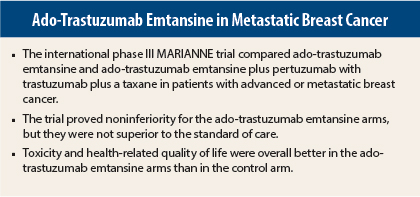Results are now in for the phase III MARIANNE trial. Although ado-trastuzumab emtansine (formerly known as T-DM1, Kadcyla) proved noninferior to trastuzumab (Herceptin) plus a taxane in the first-line metastatic breast cancer setting, it performed no better than the standard of care.1
“T-DM1 and T-DM1 plus pertuzumab demonstrated a noninferior progression-free survival compared to trastuzumab/taxane, but they were not found to be superior to it,” said Paul Ellis, MD, of Guy’s Hospital and Sarah Cannon Research Institute, London, presenting the results at the 2015 ASCO Annual Meeting.
Ado-trastuzumab emtansine was better tolerated, in some respects, and maintained health-related quality of life longer. Therefore, Dr. Ellis maintained that it is “an alternative treatment option to trastuzumab/taxane in previously untreated HER2-positive patients.”
MARIANNE Rationale
When MARIANNE was designed in 2009, trastuzumab in combination with a taxane was “far and away the commonest standard of care” in patients with untreated HER2-positive metastatic breast cancer, Dr. Ellis noted.
Ado-trastuzumab emtansine had shown strong activity in phase II studies in treated and untreated disease, with a favorable safety profile. A subsequent randomized phase II study comparing ado-trastuzumab emtansine against trastuzumab in combination with a taxane in untreated patients showed encouraging efficacy and excellent tolerability.2 Furthermore, the combination of ado-trastuzumab emtansine and pertuzumab (Perjeta) had demonstrated preclinical synergy and activity in a phase Ib/II study.3
These findings led to the international randomized MARIANNE trial, which enrolled 1,095 previously untreated patients with locally advanced or metastatic breast cancer. It evaluated three arms: trastuzumab plus docetaxel or paclitaxel (physician’s choice; trastuzumab/taxane); ado-trastuzumab emtansine plus placebo; and ado-trastuzumab emtansine plus pertuzumab.
The primary endpoint was assessment of progression-free survival by independent review, with determinations of both noninferiority and superiority. There were independent comparisons between ado-trastuzumab emtansine vs trastuzumab in combination with a taxane and ado-trastuzumab emtansine/pertuzumab vs trastuzumab in combination with a taxane.
Noninferiority Demonstrated
Median progression-free survival was 13.7 months with trastuzumab in combination with a taxane compared with 14.1 months for ado-trastuzumab emtansine (hazard ratio [HR] = 0.91, P = .31) and 15.2 months for ado-trastuzumab emtansine/pertuzumab (HR = 0.87, P = .14). This outcome met the noninferiority boundary.
By prestratified subgroups, no significant differential effects were observed. However, numerical trends favoring ado-trastuzumab emtansine were observed among patients who had received adjuvant taxanes and HER2-directed therapy (HR = 0.75) or any prior taxane (HR = 0.69).
At this first interim analysis, Dr. Ellis noted that the overall survival curves “essentially overlapped,” and median overall survival has not been reached in any arm. Events were recorded in 123 patients in the control arm, 115 in the ado-trastuzumab emtansine arm, and 115 in the ado-trastuzumab emtansine/pertuzumab arm.
Objective responses were lowest with ado-trastuzumab emtansine (59.7%), compared with trastuzumab in combination with a taxane (67.9%) and ado-trastuzumab emtansine/pertuzumab (64.2%). However, patients who responded to ado-trastuzumab emtansine (either arm) had a much longer duration of response: 20.7 months with ado-trastuzumab emtansine and 21.2 months with ado-trastuzumab emtansine/pertuzumab, compared with 12.5 months with trastuzumab in combination with a taxane.
Quality-of-Life Benefits
According to the Functional Assessment of Cancer Therapy–Breast Trial Outcome Index, health-related quality of life (a secondary endpoint) was also maintained longer in ado-trastuzumab emtansine–containing arms. The median time to a clinically meaningful decrease from baseline (≥ 5 points) was just 3.6 months for the control arm, vs 7.7 months with ado-trastuzumab emtansine and 9.0 months with ado-trastuzumab emtansine/pertuzumab.
“This suggests that health-related quality of life was prolonged in patients treated with T-DM1,” Dr. Ellis suggested.
Ado-trastuzumab emtansine was tolerated as well as—and in some respects better than—the control arm. Grade ≥ 3 adverse events were observed in 54.1% of the trastuzumab in combination with a taxane cohort, 45.4% of the ado-trastuzumab emtansine arm and 46.2% of the ado-trastuzumab emtansine/pertuzumab arm. Adverse events leading to discontinuation of any treatment component occurred in 29.7%, 18.3%, and 19.1%, respectively.
Grade ≥ 3 neutropenia, febrile neutropenia, and diarrhea were much more common with trastuzumab in combination with a taxane than with either ado-trastuzumab emtansine regimen, whereas hypertension, anemia, thrombocytopenia, and liver enzyme elevations were greater in the ado-trastuzumab emtansine arms. Pertuzumab did not “dramatically” add to these toxicities, but the drug did increase diarrhea. Alopecia was rare with ado-trastuzumab emtansine, Dr. Ellis noted. ■
Disclosure: Dr. Ellis has received travel, accommodations, and expenses from Roche Pharma AG.
References
1. Ellis PA, Barrios CH, Eiermann W, et al: Phase III, randomized study of trastuzumab emtansine ± pertuzumab vs trastuzumab + taxane for first-line treatment of HER2-positive MBC: Primary results from the MARIANNE study. 2015 ASCO Annual Meeting. Abstract 507. Presented June 1, 2015.
2. Hurvitz SA, Dirix L, Kocsis J, et al: Phase II randomized study of trastuzumab emtansine versus trastuzumab plus docetaxel in patients with human epidermal growth factor receptor 2-positive metastatic breast cancer. J Clin Oncol 31:1157-1163, 2013.
3. Miller KD, Diéras V, Harbeck N, et al: Phase IIa trial of trastuzumab emtansine with pertuzumab for patients with human epidermal growth factor receptor 2-positive, locally advanced, or metastatic breast cancer. J Clin Oncol 32:1437-1444, 2014.



